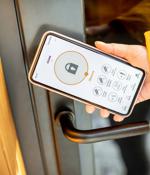Security News

The U.K. National Cyber Security Centre (NCSC) is calling on manufacturers of smart devices to comply with new legislation that prohibits them from using default passwords, effective April 29,...

Your profile can be used to present content that appears more relevant based on your possible interests, such as by adapting the order in which content is shown to you, so that it is even easier for you to find content that matches your interests. Content presented to you on this service can be based on your content personalisation profiles, which can reflect your activity on this or other services, possible interests and personal aspects.

Advertising presented to you on this service can be based on limited data, such as the website or app you are using, your non-precise location, your device type or which content you are interacting with. Your profile can be used to present content that appears more relevant based on your possible interests, such as by adapting the order in which content is shown to you, so that it is even easier for you to find content that matches your interests.

Bitdefender researchers have uncovered four vulnerabilities in webOS, the operating system running on LG smart TVs, which may offer attackers unrestricted access to the devices. The number of potentially exploitable internet-connected devices is likely smaller, as LG has patched the vulnerabilities on March 22, 2023, and some of the users have either applied the updates or have set their TVs to perform updates automatically.

Multiple security vulnerabilities have been disclosed in LG webOS running on its smart televisions that could be exploited to bypass authorization and gain root access on the devices.The findings come from Romanian cybersecurity firm Bitdefender, which discovered and reported the flaws in November 2023. The issues were fixed by LG as part of updates released on March 22, 2024.

Security researchers at Bitdefender have discovered four vulnerabilities impacting multiple versions of WebOS, the operating system used in LG smart TVs. The flaws enable varying degrees of unauthorized access and control over affected models, including authorization bypasses, privilege escalation, and command injection. The potential attacks hinge on the ability to create arbitrary accounts on the device using a service that runs on ports 3000/3001, which is available for smartphone connectivity, using a PIN. Bitdefender explains that although the vulnerable LG WebOS service is supposed to be used only in local area networks settings, Shodan internet scans show 91,000 exposed devices that are potentially vulnerable to the flaws.

If you ever wanted to play DOOM on a lawnmower, you will soon have your chance with a new software update coming to Husqvarna's robotic line of lawnmowers this spring. "The legendary 1993 video game DOOM® will be playable on Husqvarna Automower® NERA robotic lawnmower models from April this year," reads a news release on Husqvarna's site.

Taking these systems offline to upgrade them with better security can be difficult and very expensive, if it can be done at all. "Ideally this process would start with an accurate inventory of the infrastructure and systems you have, which sounds simple enough," adds Grant Bailey, Solutions Engineer with Claroty.

Security researchers have pinned a DDoS botnet that's infected potentially millions of smart TVs and set-top boxes to an eight-year-old cybercrime syndicate called Bigpanzi. "The potential for Bigpanzi-controlled TVs and STBs to broadcast violent, terroristic, or pornographic content, or to employ increasingly convincing AI-generated videos for political propaganda, poses a significant threat to social order and stability," said researchers at Chinese security biz Qianxin.

Multiple security vulnerabilities have been disclosed in Bosch BCC100 thermostats and Rexroth NXA015S-36V-B smart nutrunners that, if successfully exploited, could allow attackers to execute...